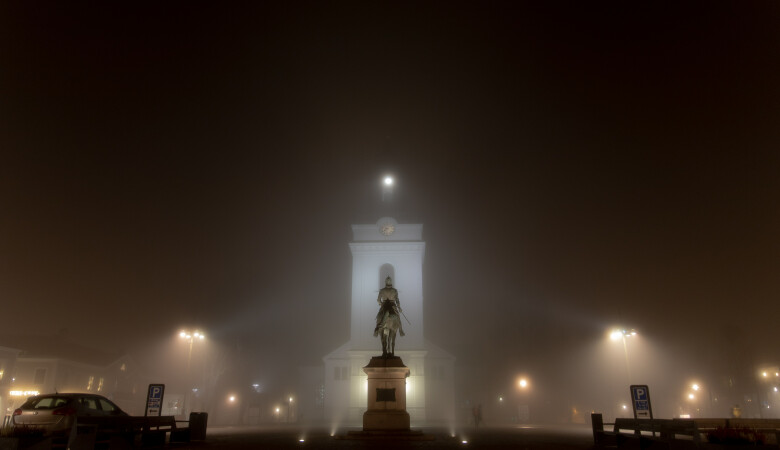Paul's Missionary Strategy and Ours (Romans Sermon 114 of 120)
September 10, 2006 | Andy Davis
Romans 15:14-22
Missions
I. Introduction: Is There a Safe Refuge?
It was five years ago this week that I preached a sermon from Psalm 46, which says, "God is our refuge and strength, an ever-present help in time of trouble. Therefore, we will not fear, though the earth give way and the mountains fall into the heart of the sea, though its waters roar and foam, and the mountains quake with their surging." I preached that because of the attacks, the terrorist attacks, on the World Trade Center. It was a very destabilizing thing, wasn't it, to see these mighty skyscrapers melting, almost literally melting, and just coming down to the ground as if sucked back to the earth? And you could wonder, what then is stable, what then is secure? This is stable. The Word of God is secure. And we praise God that we are no less secure now than we were then.
The headline this morning was, "Are we any safer?" Well, if the question is are we any safer from terrorist attacks, I don't know who could answer that. There are cells all around the world plotting their evil things. And if we're going to look to military or political solutions, I don't think we're any safer. There's been a number of terrorist attacks since then, one in England, one in India, one in Indonesia, one in Spain, one in Saudi Arabia. And who knows where the next one is going to be? Sometimes they're thwarted by government agencies, sometimes they're not.
But I praise God that we stand on a rock that'll never move. The Lord Jesus Christ is under our feet, if we have trusted in Him. And I praise God for that, even if the earth give way and fall into the sea. I praise God that Jesus is eternal and secure. And that if you are trusting in Him as your Lord and Savior, you are eternally secure, praise God for that. Find your security there. Find your security in the Word of God that will never change, not in this political solution or a CIA operation that uncovers this or that cell, or this thing that happens over in England, or that thing that happens in Afghanistan or Iraq. That's not where security is going to be found. It's found in the Word of God. And I praise God for that, don't you? I thank God for it.
And I just want to say, so often at the end of messages, pastors speak to those that have never trusted in Christ. And I'm determined to move it around in the sermon, because people tend to close up their Bibles at that point and not really listen. I think it's important that you hear me. If you came today, and you've never trusted in Christ as your Lord and Savior, you are not secure. You're actually in great danger. Do you realize that three people die every second? That means that almost a quarter of a million people die every day. Almost 3000 died at the World Trade Center that day, but almost a quarter of a million slip off into eternity every single day.
And here's the kicker, none of us knows when it's going to be our time. You don't know when you're going to die, neither do I. But the Gospel stands. The Lord Jesus stands and invites all sinners to come to Him, to repent and trust in Christ, that His blood shed on the cross is sufficient for your sins and mine. And that is secure, isn't it? It's a promise written in the heavens. "I am the resurrection and the life. He who believes in Me will live, even though he dies. And whoever lives and believes in Me will never die." My question to you is the same as that of Jesus to Martha at that time, "Do you believe this?" Have you trusted in Christ? Don't leave this room today without trusting in Christ. And furthermore, if you know somebody close to you, and the Lord is laying that person on your heart, don't let today elapse without picking up the phone and calling them about their soul. Talk to them about Jesus. You don't know when their day or your day will come. That's where security is found, and in no other place.
Why We Study the Apostle Paul
Now, the Apostle Paul, who we're going to study today, he knew that and he preached to secure Gospel. Now, today we're going to look at Paul's missionary strategies. We're going to look at Paul's missionary goals, and his success and his humility. And you may wonder, "Well, what does that have to do with my life?" Well, I can tell you this right now, the Apostle Paul doesn't need us to have a tribute dinner for him tonight. He's up in heaven. He already has all the commendation he will ever need when the Lord welcomed him with "Well done, good and faithful servant. You've been faithful in a few things, now I'll put you in charge of many things. Enter into the joy of your Master." He had all the commendation he ever wanted or needed.
So, we're not studying Paul this morning so that we can think well of Paul, or so that next time we see him, we can praise him for all of his good work. Rather we're studying Paul this morning so that we can be faithful in our good work, so we can have a strategy to reach the people God's laying on our hearts, that we, as a church, can strategize better. The very thing I talked about last week, to be faithful and active and going to frontier missions, and to be sure that what's happening once the missionaries go is biblical, that there are churches being planted in biblical ways, solid churches that will complete the great commission. That's what's my concern today, not that we praise Paul or, from a distance, study and say, "Oh, what a wonderful or marvelous man he was."
Last night. I changed around the family devotions that we've been having. We've been in Jeremiah and it's been a wonderful study, but I felt it was important for us to take a step back and look at the whole Old Testament, get a sense of the flow of redemptive history. And so we went back to Genesis and we looked at Genesis 1, and we're just going to be moving a little bit faster through the whole Old Testament, so my children and my wife and I will understand the big picture a little bit better. That's what we're doing.
The Light of the Gospel, Going Around the World
And I was thinking about that incredible chapter, Genesis 1, in which God creates the heavens and the Earth, and you know how He said, "'Let there be light,' and there was light." And He said there was evening and there was morning the first day. And then on the fourth day, God created the sun to give light to the Earth, and then the moon and the stars for light at night. And I started thinking about this thing, God set up the physical universe in such a way that half of the world is in darkness all the time. Isn't that a marvelous thing? Did he have to do that? No. He could have set up a solar system in which there would be light given to the whole surface of the earth. And as I read the Book of Revelation, there will come a time there'll be no more night and all will be filled with the light of the glory of God in the face of Christ. It's going to be glorious. But God set up a globe in which half of the world's population is in darkness now. That's an amazing thought, isn't it?
And you know why I think He did it, at least in part, maybe this? That when Isaiah, the prophet, said, "The people living in darkness have seen a great light," we will know what that's talking about, that we will know that a work has to be done to take people spiritually out of darkness and bring them into light. Two thousand years ago, God ignited a light and the light shines in the darkness and it will never be extinguished. It's the light of Jesus Christ, the light of the Gospel. It's the light of salvation. Now, was God the Father capable of creating that light in such a way that everyone in the whole world instantly saw it, instantly understood it, instantly was brought to faith in Christ? Yes, He could have done that, but instead He ordained that light bearers would go out from Christ, from His immediate circle, His apostles, His disciples, that they would start in Jerusalem, they'd go through Judea and Samaria, they'd go up through Asia Minor, and on in to Greece, and they'd make their way to Rome, and hopefully go on to Spain, and make their way across the Earth, gradually, little by little to the glory of God for 2000 years.
And the work has made immense progress to the glory of God. Many tribes and nations and peoples and languages have heard this Gospel, the Gospel of the light of the glory of God in the face of Christ. They've heard it and they've found salvation, but the work isn't finished yet. There's still work to be done. And I want to know how to finish it, I want to know what strategy we should take. What are we going to try to do for them? There's still 6600 unreached people groups, 1.6 billion people at least have never heard the name of Christ, maybe more. That's overwhelming isn't it?
Do you ever wonder what it would have been like to stand on the side of that mountain when Jesus taught all those people and the feeding of the 5000, you remember? And it's getting late and the disciples say to Jesus, "Send them away, they got to go home and get something to eat." And Jesus says, "They don't need to go away. You give them something to eat." Wow. And immediately the disciples did what you would have done, start looking in their pockets and passing the hat, and saying, "We came up with 14 dinari, but I don't think that's going to do it." And then here's this boy with his lunch. All I want you to do is just feel the feeling of overwhelm, of just being overwhelmed, of saying, "This is too big for me." And that's what I feel when I think about unreached people groups. "And I want to know, Lord, what are we going to do? What's our strategy going to be?"
And I think one of the texts we could look at today is Romans 15:14-22. We've already looked at just one verse, the competent to counsel verse, and we talked about biblical counseling. Last week, we looked at just one aspect of these verses, and that is that Paul had an intense focus on unreached people groups. He had an intense focus on the frontiers of the Gospel. And I pulled that idea out and I said, "So also must you have a focus to your life, you need to have a calling in your life. You need to not just eat every ham sandwich to the glory of God, but you need to have an overarching grand, glorious vision for your life so that when the time comes and you present your life before God, you are faithful to do all of the good works that He had ordained for you to walk in ahead of time, and so that you would live for a grand, glorious principle." I also made the case that every Christian, every local church, every church and every Christian needs to be involved in frontier missions, in either going or sending. And so I challenged, and a number of people came back with emails and with conversation, saying, "I feel God calling me to go." Praise God for that. That's exciting. And we need to stand around those people or we need to go ourselves and be faithful.
I hope we've rejected forever that third option, go send or disobey. I don't want to do the disobey thing to you. I don't want to stand in front of Jesus and will say, "Well, I chose disobey." I don't want to stand in front of Him and talk to Him like that. I want to be faithful. And if I'm not going down into the whole of heathenism, as William Carey said, "I want to hold the rope for those that are." And I want our church to do that. That was all last week.
II. Paul’s Six-Fold Missionary Strategy
Now, this week, what I want to do is I want to look at all of these verses and the details that are in it, and try to learn from Paul how he went about his work. I want to learn what his strategy was, and I want to learn it so that I can apply it in my own life, so that we can apply it here in this church. Whether you're going to be a frontier missionary, whether you're just going to work tomorrow morning, you have a mission field to work, you have something that God is calling you to do. He's calling you to be a witness, and I think it'd be good for you to have a strategy and follow it the way Paul did.
1) Founding All Things on God’s Written Word
Now, let's look at it. Let's start with the first aspect, and that is the founding of all things on the Word of God. Now, I find it a couple of places in this text. Most plainly, you look at Paul's ambition, we'll get to it again later, but verse 20-21, it says, "It has always been my ambition to preach the Gospel where Christ was not known so that I would not be building on someone else's foundation. Rather, as it is written…" Now, just stop there. You see what Paul is doing there? He's founding his whole missionary strategy, on the Word of God, as it is written. Dozens of times Paul has done this in the Letter to Romans. Again and again, he's founding his doctrine, he's founding his whole approach on Scripture, on the written Word of God, "Rather, as it is written…" from the Book of Isaiah, "Those who were not told about Him will see, and those who have not heard will understand. And this is why I have often been hindered from coming to you."
So Paul founds his strategy on the written Word of God, the Book of Isaiah in this case. At the front end of the passage, in verse 15-16, we see Paul talking about his own writing. And he says, "You're competent to counsel, you're full of wisdom, completing goodness, and competent to counsel one another. Nevertheless, I have written you. I've written you boldly," he says, "on some points, as if to remind you of them again because of the grace God gave me to be a minister of Christ Jesus to the Gentiles," etcetera. So, he's talking about his own writing there. And that's the New Testament, the writing of an apostle. And Paul knew he was an apostle, and he knew he wrote authoritatively. He didn't say things like, "Well, you might want to consider this way of looking at things," etcetera. That's not the way he wrote. He was an apostle of the Lord Jesus Christ, and he wrote doctrine to them. And so we see right up front that Paul founded all things on God's written Word.
2) Proclaiming the Gospel of Jesus Christ
Secondly, we see that Paul founded his ministry on a clear proclamation of the Gospel of Jesus Christ. Again, 15 and 16, "I have written you quite boldly on some points as if to remind you of them again because of the grace God gave me to be a minister of Christ Jesus to the Gentiles, with the priestly duty of proclaiming the Gospel of God." Now, when Paul came to a new community, didn't matter what it was... Maybe it was Pisidia and Antioch, maybe it was Troas, maybe it was Philippi, maybe it was Athens, it didn't matter. The first thing on his mind is, "I need to preach Christ." It was proclamation, like a herald going out from a king. He's going with good news, and he's going to stand in the public square and he's going to proclaim the kingdom of God. He's going to proclaim forgiveness of sins in Jesus' name. He's going to set up the cross of Christ in their minds through his preaching. He's going to preach the Son of God crucified and risen for sin. He's going to preach that, that's what he's going to do. He preached the person of Christ, His deity, His humanity. He preached His works, His words. He preached Christ crucified, that's what he did.
Now, this is the Gospel that He described at the beginning of this epistle, Romans 1:16, as being the "power of God for the salvation of everyone who believes." Paul believed that. He believed this was the power of God to get people who are walking in darkness, to see a great light and be saved. He wanted to go to a dark pagan community and preach Christ, they'd never heard of Him before, and see the light shine in the darkness to the glory of God. He wanted to preach that message. It was a preached message.
Now, in the modern times, missions can involve a lot of complexities. There can be all kinds of interesting things that missionaries can be called to do and some of them very necessary. Some missionaries go and build church buildings or other kinds of buildings, because the community needs it. Some build hospitals, some work as doctors and nurses in those hospitals, some missionaries go as tent makers and establish a professional presence in a place that otherwise would be a closed country that would not welcome a missionary.
I was going on a short-term mission trip once to a closed country, and the country that was giving out the visa questioned me quite closely, actually called me from the embassy, to ask me what my profession was. Very interesting. Teacher apparently wasn't good enough for them. They want to know what kind of a teacher, and I said, "I'm a pastor." And they asked me a lot of questions about my intention in that country, and they sent back a visa and on the visa it said, in one word, no spaces in between, "missionary work, not allowed." "Missionary work, not allowed." But they misspelled "missionary," so I decided I wasn't going to do that, whatever that was. But I was going to be faithful to preach the Gospel because the Lord had called me to do it. So, I didn't do that thing. I still don't know what the definition is, and I don't want to do it, whatever they've commanded, I will not do it. But I'm going to do the missionary work that the Lord has laid on my heart.
The point I'm making is that you need, in some of these countries, Muslim countries, some of these other places, you need a reason to be in there. Some people run powerful radio stations and they put out signals, and they go all over in that whole region with the powerful radio signals. And all of those works and others are necessary. But the center of all true missionary work is the verbal proclamation of the Gospel of Jesus Christ. That's the center of it. And if that isn't going on, then true missionary work is not happening.
3) Speaking and Living God’s Truth
Thirdly, speaking and living God's truth. Romans 15:18, it says, "I will not venture to speak of anything except what Christ has accomplished through me in leading the Gentiles to obey God by what I have said and done." Do you see that phrase? "By what I have said and done," God has led the Gentiles to obey Him. What does this mean, "by what I have said and done?" Well, I think there's a twofold pattern of Paul's strategy. He's going to speak God's truth, and he's going to live God's truth. He's going to speak right doctrine, and by this now, I mean, more than just the milk of the Gospel... The Gospel is beginning doctrine, that's how we start, but there's more doctrine than that. And Paul would settle into a community, sometimes for two years or perhaps even more, and he would be faithful to speak the Word of God very thoroughly and very completely.
Some people have noted, because Paul later in this section, in Romans 15, asks the Roman church for help in his missionary journey to Spain. They said, "Well, I conclude that Romans is a missionary support letter." Well, that's wonderful. It's got to be the greatest missionary support letter in history. It's an awesome missionary support letter. But let's accept that, that's fine. But I say this, it is an unfolding of the doctrine of the Gospel unparalleled than all of Scripture. And we see therefore that Paul considered the fullness of the doctrine to be essential to his mission. It wasn't just the simple ideas of Christ and Him crucified. In Romans, you have far more than that. Romans 1, 2 and 3, you have unfolded very plainly the doctrine of universal depravity and sin. "There is no one righteous, not even one." He's very careful in unfolding this. In Romans 3 and 4, we have the doctrine of justification by faith alone. And there again, he asks that question, founding everything on scripture, he asks about Abraham. What does the scripture say? But he's trying to found his doctrine and Scripture. He's unfolding deep doctrine.
Romans 5, he's talking about original sin and Adam, and how the whole human race sinned in Adam. These are deep thoughts. Romans 6, sanctification, putting sin to death. Romans 7, the bitter struggle with sin. Romans 8, we have the power of the indwelling Holy Spirit for this fight that we have against sin and for the fulfillment of the work of God. In Romans 9, 10 and 11, we have the deep doctrines of predestination and God's sovereignty applied to the troubling case of why the Jews are almost universally rejecting the Gospel. Deep doctrines. And Paul doesn't shy back from speaking about the truth of God. He said in Acts 20, to the Ephesian Elders, he said, "Now, you remember my ministry and how from house to house I didn't hesitate to proclaim anything that would be helpful for you, but have taught you publicly and from house to house." He also says later, "I did not shrink back from proclaiming the whole counsel of God's Word."
And so, based on what Paul said, he builds the kingdom. But here's the thing, he's there. He's living in the community. They watch his lifestyle. "It's not just by what I've said, it's also by what I've done." Remember how he said in Philippians Chapter 4, "Whatever you have learned or received or heard from me, or seen in me, put it into practice and the God of peace will be with you." Wow. How would you like to say that to your disciple? "Whatever you've seen in my life, put it in practice and God will be with you." But Paul set himself up not arrogantly. We're going to see later in this message he's not an arrogant person, but he knew that part of the missionary work was incarnational. You live in there. They see the way you live. And it's not just what you say, it's how you live. It's an integration of truth and life that was key to his strategy.
4) Performing Signs and Wonders
Fourthly, we also see the issue of signs and wonders. And here, many of you may be saying, "Well, see, now this is where we're going to be different from the Apostle Paul." And you would be right. Because the Apostle Paul was an apostle. I'm not saying miracles don't happen today. I've been on the mission field and I've heard clear testimony, from brothers and sisters in Christ whose lives I respect, of supernatural acts of God. But they are different in essence, I think, than the apostolic miracles that Paul did. But there it is, look at Verse 18-19, he says, "I will not venture to speak of anything except what Christ has accomplished through me in leading the Gentiles to obey God by what I have said and done." And then in Verse 19, "By the power of signs and miracles, through the power of the Spirit."
Now, I think 21st Century Americans are a little bit squeamish when it comes to signs and wonders. One great missionary article I read was called The Flaw of the Excluded Middle, how American evangelicals tend to exalt God in the heavenly realms, and see God up there in the heavenly realms, and believe in the invisible God by faith, they accept that, and they live in a workaday world, the physical practical world, and they accept that, but they don't see a lot of interaction between the two in the middle realm of signs and wonders, also of demons and angels, and all of that stuff that most of the world accepts readily. And it's in the Bible. It's all part of the biblical world view. And they'll extend the squeamishness even to reading about what the Apostle Paul did and say, "Well, you know... " And they try to minimize the role of signs and wonders in the apostolic ministry. We should never do this.
Paul here clearly ascribes the power of his ministry, at least in part, to the effectiveness of signs and wonders done by the Holy Spirit of God through him. And he said these were the things that marked him as an apostle. That's why we're different than Paul, we are not apostles. But these things marked Paul as an apostle. 2 Corinthians 12:12 says, "The things that marked an apostle, signs, wonders and miracles, were done among you with great perseverance." Now, these signs and wonders had evangelistic power. They had evangelistic power. Jesus himself said in John Chapter 14:11, "Believe me when I say I'm in the Father, or at least believe on the evidence of the miracles themselves." There, He linked saving faith to the power and the evidence of the miracles. There's nothing wrong with saying that miracles have evangelistic power when coupled with the message of the Gospel.
Miracles also help prove the truthfulness of the apostolic Gospel message. In Acts 14, talking about Pisidia and Antioch, Paul and Barnabas spent considerable time there speaking boldly for the Lord, who confirmed the message of His grace by enabling them to do signs and wonders among the people. He confirmed it, He said, "This is a true message. Look, these people have been healed," etcetera. They also were very effective for drawing a crowd. It is where, in Acts Chapter 3, Peter and John went up to pray at the time of prayer, and they heal a famous beggar, and a huge crowd comes running. And Peter says, "good preaching opportunity." And that's exactly what was happening again and again through the Book of Acts, a sign or a wonder would be done, huge crowds would gather, and they would preach the Gospel, by the power of signs and wonders.
They also had the power to encourage the church. Remember the story of Paul in Troas, and he's probably never going to go there again. And so he spends hours and hours teaching the people. And seated in the window was a young man named Eutychus, probably a teenager, and so he's just sitting there and listening, this young man, that's probably what he was, listening to the Word of God, interested in what Paul was saying. But it was getting hot, it was getting late, Paul was talking on and on, is what Luke wrote in the Book of Acts. They got the oil lanterns in there, there's not electricity, and it's just... He fell asleep. The only problem was he was on the third story, he fell out of the third-story window and was picked up dead. Paul went down and threw himself on this young man and said, "Don't be alarmed…he's alive." God raised him from the dead. And this is what Acts 20 Verse 12 says, "The people took the young man home alive and were greatly comforted." They're greatly comforted at a clear display of God's power over death. God is the death conqueror. He is sovereign. He's powerful. And even if He doesn't do it every time, even if He doesn't ever do it again, just know that God is powerful. They were greatly encouraged and comforted by these apostolic ministries.
5) Demonstrating the Power of the Holy Spirit
Fifth, there was also a display or a demonstration of the Spirit's power. He says, "By the power of signs and miracles, through the power of the Spirit." Let me tell you Paul's missionary strategy, it basically went like this. "I'm going to follow where the Holy Spirit leads, I'm going to speak what the Holy Spirit tells me to speak, I'm going to do it in the open and obvious power of the Holy Spirit, I'm going to rely on the Holy Spirit's power to convict and to convert and to plant the church, I'm relying on the Holy Spirit's power to protect that little church after I have planted it." Everything was done as a display and a demonstration of the Spirit's power.
Paul's ministry was a constant display of the power of the Holy Spirit in the midst of his own weakness. 1 Corinthians Chapter 2, Paul talks about this. He said, "When I came to you, brothers, I didn't come with eloquence or superior wisdom as I proclaimed to you the testimony about God." That wasn't it. You don't have to go to speaking school, eloquent school, to be an effective missionary. That's not it. What was it then? He said, "I resolved to know nothing while I was with you except Jesus Christ and Him crucified. I came to you in weakness and fear and with much trembling. My message, my preaching were not with wise and persuasive words, but with the demonstration of the Spirit's power, so that your faith might not rest on man's wisdom but on God's power." He basically wants to plant a church in such a way that everyone can see, "It must not have been Paul."
Remember how one of the Corinthians said, "His letters are weighty and forceful, but in person he is rather unimpressive…" Not a great speaker, just a simple message of Christ and him crucified. And look what sprang up. Look what happened. A church was planted, lives were transformed, pagans gave up their paganism, rich people gave up their concern about wealth, poor people understood that in Christ they could be rich. Everything was changed and a church was planted. For eternity, lives were changed. That is a demonstration of the Spirit's power. That's something nobody can do. I could preach for 100 years and if the Spirit is not here, I have wasted my time and yours. I prayed this morning on my knees, I begged that the Spirit of God would be here today, or else I would waste my time and yours. And I'm convinced He is. I'm convinced He's at work in your hearts and mine, too, a clear demonstration of the Spirit's power. Not in technique, or you got to have Paul or nothing happens. "I'm leaving," Paul said. He's going. He's going to plant the church and go. You need to know that from here on out, the Holy Spirit's still with you and you're going to still make progress in the Spirit, a demonstration of the Spirit's power.
6) Venturing Where Christ Is Not Yet Known
And then sixth, venturing or Christ was not known. We've already covered this, but it's a clear technique. Paul said, "I'm passing on. I'm not going to stay here. You're not going to rely on me forever and ever. I'm going to get the church started, I'm going to establish Godly elders and train them, get them in place. I'm going to give you the best I've got for a couple of years, teach you everything, not shrink back from anything, but the rest is up to God by the power of the Spirit. I'm moving on." He was going to continue to move on to those unreached people groups.
And so we see a brief display of Paul's missionary strategy, founding all things on God's written Word, proclaiming the Gospel of Jesus Christ, speaking and living God's truth in an integrated way, performing signs and wonders, a demonstration of the power of the Holy Spirit of God, and a commitment to go to unreached people groups, to continue to move on.
III. Paul’s Missionary Goals
Now, what were his goals?
A Display of the Glory of God
Well, the top goal of the Apostle Paul was that God would be glorified as a result. He says in Verse 17, "Therefore, I glory in Christ Jesus, in my service to God." Just as He had said in Verse 9, "so that the Gentiles might glorify God for His mercy," he wanted the Gospel ministry to be for the praise of God's glory, that's why he did everything.
The Fulfillment of His Priestly Duty
Secondly, his goal was to fulfill his priestly duty. God told him on the road to Damascus, "I'm giving you this work to do. I'm giving you this work to do. I want you to do this work." And his priestly duty was to proclaim the Gospel to the Gentiles. He says in Acts 26, "So then, King Agrippa, I was not disobedient to the vision from heaven. First to those in Damascus, and then to those in Jerusalem, and now Judea, and to the Gentiles also. I preach that they should repent and turn to God, and prove their repentance by their deeds." Paul was given a priestly ministry. He said, "I wasn't disobedient."
Can I just stop and ask you a question? We asked last week, do you have a task that the Lord Jesus gave you? Are you running a race that Christ set in front of you? And if you say, "Yes, I know what it is, I know what my calling is," the second question is, Have you been disobedient to that calling?" See, the Apostle Paul said to King Agrippa, "I was not disobedient to the heavenly vision, but I did what God wanted me to do. That was my priestly ministry." You see, we are priests of Christ. We are given a priestly duty. Paul's was proclaiming the Gospel to the Gentiles.
The Ultimate Offering of the Gentiles
He also says the result of that would be the ultimate offering of the Gentiles. He was like a Levite or ironic priest. He was offering up sacrifices to God. Now, the Levites, the priests, they offered up bulls and goats, blood sacrifice. Paul is not doing that. You know what he's offering up? Gentiles. And this is how it worked. He'd go into a place steeped in paganism, the people are dead in their transgressions and sins, without hope and without God in the world. He simply preaches the Gospel by the power of God, and as a result, lives are transformed. What happens? In those individual lives, the call of God goes, "Do not be conformed to this world, but be transformed by the renewing of your mind, and offer your bodies as living sacrifices, holy and pleasing to God." And so all of a sudden, you got all these Gentiles who are converted, their minds are changed, and now they are offering their bodies every day as living sacrifices, so that the Gentiles might become an offering to God, acceptable, pleasing to God by the Holy Spirit. That was his goal.
The Glad Obedience of the Gentiles
And finally, that their obedience would be the offering. See, the Gospel needs to result in obedience. This is the Alpha and the Omega of the Book of Romans. Perhaps you haven't noticed it before, but they are in Romans Chapter 1 Verse 5, Paul says this, "Through Christ, and for His name's sake, we receive grace and apostleship to call people from among all the Gentiles to the obedience that comes from faith." Dear friend, if your faith is not producing in you a lifestyle of glad obedience, it is counterfeit and you're not saved. Obedience. For the obedience of the Gentiles, that was his work. Glad obedience, that's the Alpha. And then at the end, in Romans 16:26, probably just look over on the same page that we're on, Paul preaches the Gospel so that all nations might believe and obey Christ. So, Romans 1:5, Romans 16:26, the Alpha and the Omega, right straight through, it is a Gospel that produces glad obedience. Look at your life. Is it characterized by obedience to the commands of Jesus Christ?
IV. Paul’s Astonishing Success
Finally, what was Paul's success like? Well, he says, "From Jerusalem, all the way around to Illyricum, I have fully proclaimed the Gospel of Christ." That's amazing geographical spread. He's gone basically 1400 miles, from Jerusalem through Judea and Samaria, up into Asia Minor, across to Philippi, Macedonia, down into Achaia, and over as far as modern day Yugoslavia, right across from the Adriatic, from the Italian boot, he's made 1400 miles of preaching in frontier regions, preaching the Gospel. And he says, "There's nowhere else for me to work. I have so saturated that region that there's no frontier here anymore." It doesn't mean that everybody has heard the Gospel, but what it means is, in every area, in every region, there are significant healthy, growing churches who can finish the work, including in Rome. Now, he says he's going on to Spain. That's amazing success.
Now, you might think all of this would go to his head. Right? "Look at all I've done. Look at all the things that I've achieved." But instead, he had a very appropriate humility. Look at Verse 17-18, "Therefore I glory in Christ Jesus in my service to God. I will not venture to speak of anything except what Christ has accomplished through me, in leading the Gentiles to obey God by what I have said and done." He says, "I'm not going to boast in myself." One of the big differences between us and lost people, between Christians and lost people, is this... This is in John Chapter 3. It says there, "Everyone who does not live by the truth, hates the light, and will not come into the light for fear that his deeds will be exposed." They don't want to come into the light because they don't want to show what they've done, the despicable deeds of darkness, they don't want to show it.
But, John 3:21, "Everyone who lives by the truth comes into the light." Why? "So that it may be seen plainly that what he has done has been done through God." We're going to get up there and we're going to carry with us a whole truckload of acts of obedience done by faith in Christ, our ministry, our life work, and we are going to present it to God. And it will be made plain and obvious at that time, that each one of those good things will be refined by fire, 1 Corinthians 3, but there, each one of those jewels in the diadem were accomplished by the power of God in us. That God, by His power, led us to lead this person to Christ, or to plant this church, or to pray this prayer, to give this money. All of it was done by the power of God working in us and to the praise of His glory. And there you'll have your diadem, your crown, and may it have many jewels in it, and there you will lay it down at the feet of the one who deserves it, because all that we have accomplished, Isaiah 26:12, he has done through us and to the glory of God. And so therefore Paul is appropriately humble.
V. Application
What's the application for you? Well, as you look at the life of Paul, last time the application was you needed a concentrated focus to your life and you needed to be concerned about frontier missions. And so you do. What I get out of these verses that we've studied today is you need to have a strategy. How are you going to go about doing it? Suppose the focus right now in your mind is your family. Maybe it's a parent that doesn't know Christ, maybe it's a brother, a sister. What's your strategy? What's your approach? How are you going to take these principles and bring it to bear in that life? Perhaps it's a workplace. Maybe you're going to go to work tomorrow, don't let it be just another day. You've got a mission field there. What is your strategy? How are you going to bring these principles to bear in that workplace?
Perhaps it's a dorm floor, fraternity or sorority, and on a college campus. What's your strategy? How are you going to go about leading those people to Christ? Perhaps you're preparing to be a frontier missionary. Maybe you're at the seminary at Southeastern. What's your strategy going to be when you get to that unreached people group? How are you going to do this over there? What's your approach going to be to the glory of God?
Now, I'm going to end where I began. And if you don't know Christ as your Savior, you don't need a strategy. You need to come to Christ today. You need to believe in Him and trust in Him for the salvation of your soul. Just about every week, when I sit out in the pew and I worship, I look at this wooden cross up here and I remind myself of the price that was paid for my salvation. I think about it every week. I think about what Jesus did when He went up that hill carrying the cross. I'm saying to you, if you don't know Christ, you're not ready to die. This afternoon, we're going to do a funeral. I'm saying, you're not ready to die if you don't know Jesus. Trust in Him for the salvation of your soul. Close with me now in prayer.






























